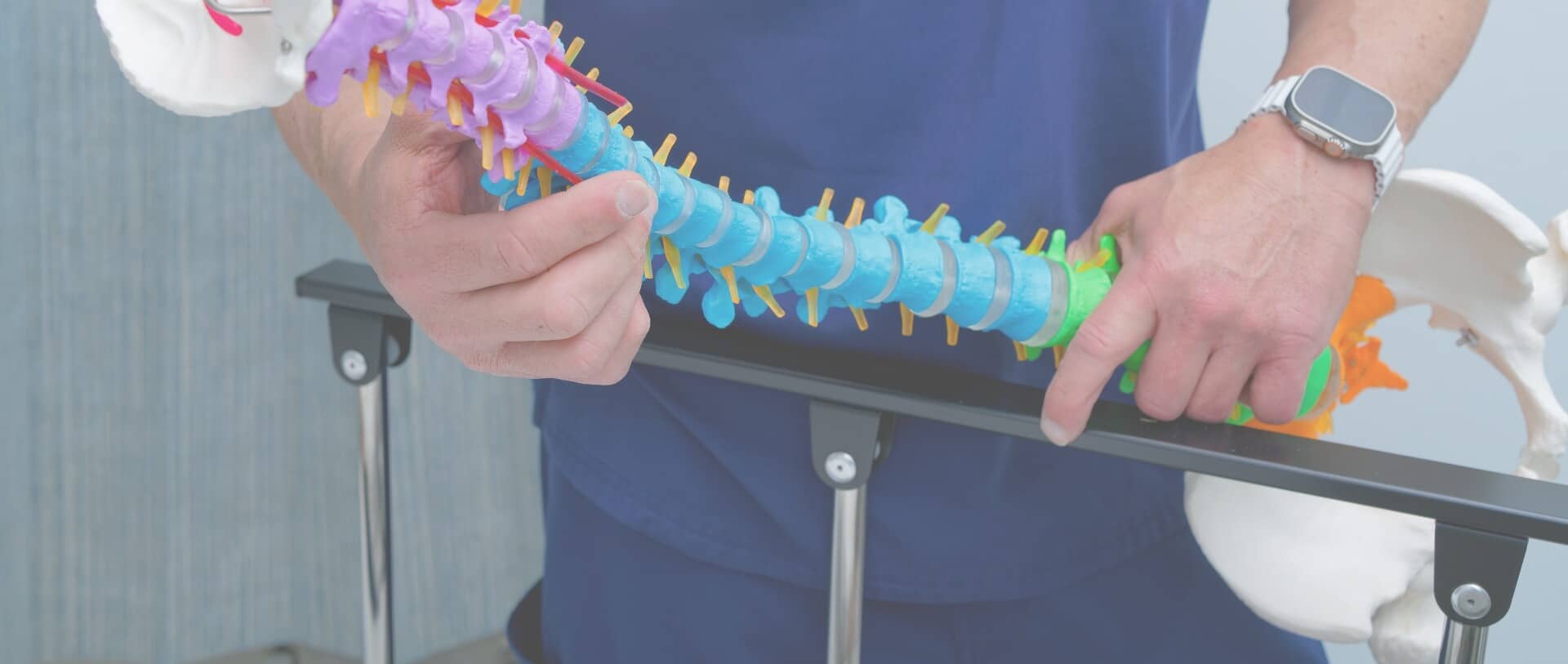
PROCEDURES
Microdiscectomy
The intervertebral discs in your spine are located between each bone, providing a cushioning effect that allows for full flexibility. If a disc ruptures, bulges, or herniates, it can compress a nerve as it exits the spinal column, resulting in back pain and numbness or weakness in your extremities. A microdiscectomy is a minimally invasive solution to remove a portion of the damaged disc. Dr. Jamie Gottlieb performs microdiscectomies with expert precision and care. Contact us today to schedule a consultation.
Normal Room for Nerve Roots
The vertebrae, which stack up to create the spinal column, surround and protect the spinal cord. In the lumbar spine, they protect the nerve roots, or the cauda equina. The discs are located between each vertebrae. Discs consist of a fibrous outer layer (annulus) surrounding a gelatinous center (nucleus). They allow motion between vertebrae act as shock absorbers, and distribute the stress and strain placed on the spine regularly.
Herniated Discs
When a disc weakens, the annulus may not be able to hold the nucleus in place. This causes the disc to protrude into the spinal canal, potentially irritating the spinal nerve roots. In advanced cases, the nucleus may rupture through the annulus and pinch the spinal nerve roots; this is known as a herniated disc. A herniated disc can cause pain that radiates down the legs, and if the pressure on the spinal nerve roots continues, numbness or muscle weakness in the leg or foot may develop.
What is a Microdiscectomy?
A microdiscectomy is a surgery to remove pressure on a nerve caused by a disc herniation. Also referred to as a microdiscectomy decompression, the procedure is done endoscopically to decompress the affected nerve root(s) while protecting other nerves around the damaged disc
What Conditions Does a Microdiscectomy Treat?
While a microdiscectomy is primarily performed to treat herniated discs, it can effectively treat several related conditions and symptoms, including:
- Sciatica: Sciatic nerve pain is characterized by pain that runs down the sciatic nerve, from the lower back down the leg
- Nerve compression: A pinched nerve can cause symptoms like shooting pain, numbness, and weakness
- Radicular pain: Radicular pain refers to pain that radiates along a specific nerve pathway. A microdiscectomy addresses the underlying nerve compression to relieve this type of pain
- Leg pain: Leg pain, particularly when it stems from a herniated disc compressing the spinal nerves, can be significantly improved with a microdiscectomy
What are the Steps to Microdiscectomy Surgery?
- Incision: Dr. Gottlieb will make a small incision, around one inch in length, along the spine where the herniated disc is located
- Access: Using specialized instruments and a microscope, Dr. Gottlieb will gently move aside any obstructing muscles or tissues to access the vertebrae and disc.
- Removal of disc material: Depending on the location of the affected nerve(s), Dr. Gottlieb may perform a slightly different microdiscectomy procedure.
- A lumbar microdiscectomy targets a herniated disc in the lower back
- A cervical microdiscectomy targets a herniated disc in the neck
- Closure: After the disc material is removed and Dr. Gottlieb has confirmed there is no remaining pressure on the nerves, muscles and tissues are put back in place and the incision is closed using sutures or surgical staples
What is a Laser Discectomy?
A laser microdiscectomy is the least invasive microdiscectomy technique, eliminating the need for an incision. Instead of using a scalpel to remove the disc material, Dr. Gottlieb will use a needle to access the affected area and employ laser technology to safely eliminate the damaged portion of the disc. This approach to spine surgery minimizes trauma to the body.
Will I Need a Microdiscectomy?
A microdiscectomy is often done to relieve leg pain (also known as radiculopathy or sciatic nerve pain\) caused by a herniated disc. You may need lumbar microdiscectomy surgery if your leg pain:
- Is severe enough to prevent you from performing your daily activities
- Results in a loss of strength or mobility
- Doesn’t improve after several weeks of conservative treatment
Cauda equina syndrome can occur when the nerve roots in the lumbar spine are compressed. Symptoms of cauda equina syndrome affect your genitals, bladder, and intestines, and may include:
- Weakness in the legs
- Loss of bladder or bowel control
- Tingling or numbness in the buttocks or genitals
A lumbar microdiscectomy is typically the recommended procedure for cauda equina syndrome.

Top Quality Care at Gottlieb Spine
With advanced minimally invasive techniques, Dr. Gottlieb offers relief and restoration to those suffering from the discomfort caused by herniated discs. Microdiscectomy surgery at Gottlieb Spine may be the solution for your condition. Contact us today to schedule a consultation.
SCHEDULE A CONSULTATION